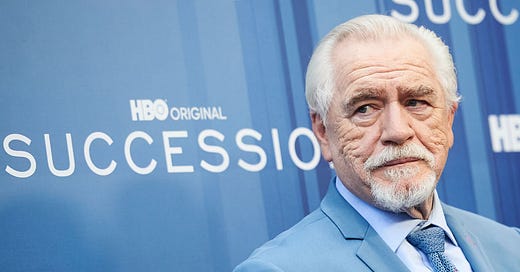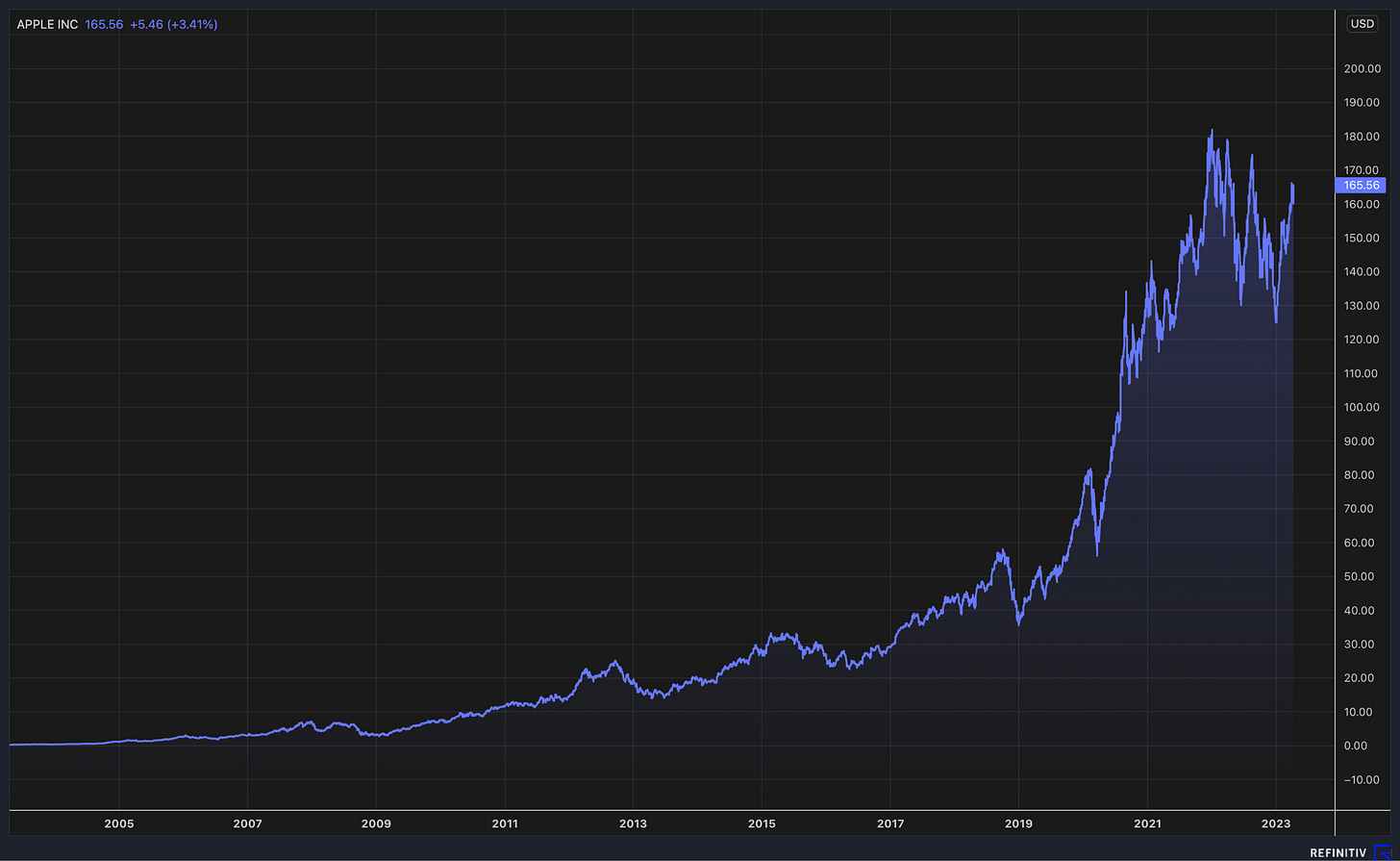Succession planning
Apple, Tesco and when it goes right and wrong + New podcast episode + Other stories that matter
As the fourth and final series of Succession progresses, the question of who will eventually succeed Logan Roy as the head of the family media business remains unanswered. No spoilers here, but for those who haven’t watched it, this week’s episode is important…
Given that latest episode I wanted to take this opportunity to explore succession planning in more depth. It is a vital issue for businesses, particularly in the UK, where the failure to convert more promising start-ups into big businesses is partly due to founders either failing to bring in management expertise around them or selling their business off instead of passing control to a new chief executive.
Succession planning is also on my mind after reading a superb book this week about Steve Jobs. The Steve Jobs Archive, which was set-up by his family and friends, has released a free 250-page book that includes a collection of Jobs’ speeches, interviews and correspondence. It is free to download and read below…
Jobs, the co-founder and chief executive of Apple (as well as the co-founder of Pixar and NeXT), died in 2011. As the book demonstrates, he was a rare and extraordinary character, but also a deep thinker and powerful personality. You can find a useful summary of the book here.
Jobs was Apple in so many ways. However, 12 years after his death, Apple is the most valuable company in the US. Tim Cook, Job’s successor, is still in charge. Cook was chief operating officer at Apple under Jobs, joining in 1998. This was just after Jobs had returned to Apple more than a decade after he was infamously pushed out of his own company by John Sculley, who he had brought in as chief executive…
Critics of Apple post-Jobs say the company still relies on the products developed by its co-founder. The Apple Watch is the only significant new device that the company has launched since he died, with the iPhone, Mac, MacBook and iPad still its main hardware. However, Cook has expanded the breadth and capabilities of the company’s products and commercialised the Apple App Store. The company’s share price performance since 2011 tells you that the succession plan at Apple has worked brilliantly. This graph shows Apple shares over the last 20 years…
Cook gave an insight into why the plan worked at Apple during an interview with CNBC in 2017, when he talked about what may happen when he stands down. Cook said:
“I see my role as CEO to prepare as many people as I can to be CEO, and that’s what I’m doing. And then the board makes a decision at that point in time.”
I have covered companies where succession went less well. I was reporting on Tesco for The Daily Telegraph when Philip Clarke succeeded Sir Terry Leahy as chief executive of the retailer in 2011, the same year that Jobs died. Clarke, like Sir Terry, was a Liverpudlian who had spent his career at Tesco. It was a romantic story. But it didn’t work. This is Tesco’s share price graph over the last 20 years…
That graph tells a very different story to Apple. Clarke was ousted in 2014 and replaced by Dave Lewis. Tesco was then engulfed in an accounting scandal after Lewis told the City that the company had found accounting irregularities going back over the previous years.
Tesco has never regained the heights it reached under Sir Terry. I interviewed Clarke many times while he was boss of Tesco. I particularly remember sitting down with him for an interview at the start of 2014 when the pressure on him was mounting. Clarke defended his strategy and pointed to the difficult legacy he had inherited - an overheating UK business where prices were too high, a failed and costly expansion into the US, and a brand that he claimed had “baggage”. This is the interview here. The news story from it is below…
Lord MacLaurin, Sir Terry’s predecessor at Tesco, pointedly blamed the problems at Tesco on Sir Terry and the legacy he had left, not Clarke. However, others felt very different. Clarke’s comments about the damage to the brand prompted a backlash by former directors and some inside Tesco. This quote from a April 2014 article I did while at The Telegraph sums up the criticism of Clarke at the time. It is from a former Tesco director. Clarke was gone three months later…
“You should be judged after three years and the judgement has to be harsh. The business is much worse. Not just financially, but it is also a worse business culturally and in terms of confidence.”
The recent history of Tesco is a topic that I will be exploring further in a future episode of Business Studies. Succession planning is an issue that has come constantly in episodes so far. We have interviewed the founders of some of the UK’s biggest tech companies and long-serving FTSE 100 chief executives such as Andre Lacroix at Intertek and Miles Roberts at DS Smith. Succession is a big issue for all these businesses.
A founder who has thought about succession in great depth is Richard Tang, the founder and chief executive of Zen Internet, which is based in Rochdale and is the oldest independent internet provider in the UK. In the Business Studies episode called “The founder who has promised never to sell” Tang expressed concerns about what happens to his company when he dies and explained how is he trying to protect its approach, which aims to put customers, staff and suppliers ahead of profits. It was a fascinating conversation. Here is a key extract:
“This is a really big challenge. I've done a lot of research into this. What I've got in place today is something in my will that my shares will go into a trust, I've written a letter of wishes to the trustee that basically says ‘Stick to the values and don't sell out’.
“What I want to do is to set-up a charitable foundation. This is something I've been working on for the last couple of years. The benefits of a charity are that a trust in UK law is limited to 125 years. That is a long time. But actually with a charity it can go on in perpetuity. And a trust is ultimately for the benefit of the beneficiaries of that trust. Who are they in my mind for Zen? I don't want to give it to my family. It's not necessarily the staff, the customers. It's for everyone. It's for society, really. So there's no specific set of beneficiaries. But with a charity, you've not got that issue. So my end goal is to establish this charity and for the shares to transfer into the charity. That might happen either on my death through my will or it might happen in my lifetime so I can make sure that the trust is operating as I would like it to operate.”
You can listen to the full interview with Richard Tang here.
New Business Studies episode…
The latest episode of Business Studies went live on Tuesday. It looks at lessons from the Dot-com crash with Rob Hornby, the managing director for Alix Partners, the consultancy firm, in London, and someone who has spent his career working in technology. In the episode we look at what happened in 2000, why it happened and what can be learned from it today. You can also enjoy Jeff Bezos talking about Amazon’s experience of the Dot-com crash and Hornby talking about the collapse of Arthur Andersen in 2002 while he was working there. You can listen to the episode on Substack here, Apple here and Spotify here.
Other stories that matter…
Doncaster Council is in talks with Peel Group about leasing Doncaster Sheffield Airport and trying to reopen it themselves. The council is also seeking legal protection to block any development of the site (The Yorkshire Post)
A £700 million redevelopment of Honda’s closed factory in Swindon has been approved. A collection of new warehouses will be built on the site (Business Live)
A fascinating look at leadership by author David Epstein and how myths about confidence and courage have hidden the skills that really matter (Range Widely)
An analysis of new products that Artifact and Substack have launched in an attempt to take-on Twitter (Platformer)
And finally…
Another reason to watch the latest episode of Succession….
Away from TV, I spent the Easter weekend on the south-coast with family. It was brilliant, helped by a superb Easter Sunday roast at the excellent Burger & Bird in Peacehaven. You can find the restaurant here.
Thanks for reading. If you enjoy Off to Lunch then please share it with others and spread the word. If this newsletter was shared with you then please sign-up below to become a member, get Off to Lunch sent directly to your inbox, attend our forthcoming events and contribute to the work of Off to Lunch. I will be back with the Sunday press review on Sunday
Best
Graham











